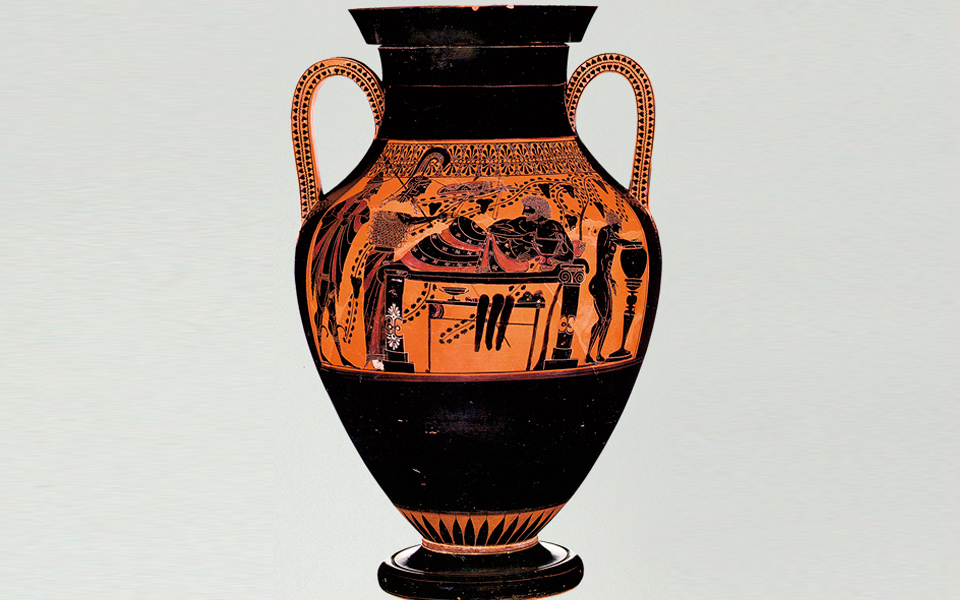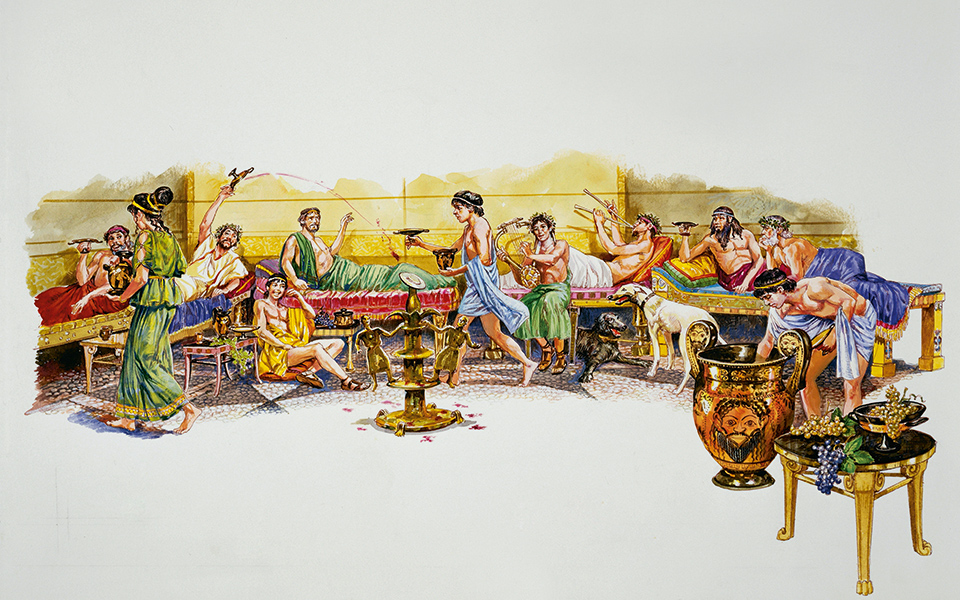Gastronomy, in other words the art of good eating, has enjoyed great popularity in recent years, and might even be considered one of the highest aspects of a people’s culture. The ancient Greeks had elevated cooking to a culinary art long before their culture had reached its peak. One hundred years before the Golden Age of Pericles, the Greek city of Sybaris in Magna Graecia (southern Italy) had become famous throughout the Greek-speaking world for its great wealth and sumptuous feasts. The inhabitants had created dishes that would certainly not be out of place in today’s modern gastronomic culture. “In Sybaris, if any cook invented a peculiar and excellent dish, no other person was allowed to make it for one year” (Athenaeus). The first gastronome in history is considered to be the 4th century BC Greek poet Archestratus of Gela in Sicily, who wrote a didactic poem advising readers where to find the best food in the Mediterranean. Sicily also produced the first cookbooks, including that of Mithaecus, who is mentioned in one of Plato’s dialogues, while another writer describes him as the “Pheidias of the kitchen.”
But what was happening in Athens? As the city-state’s power grew, the standard of living of its citizens rose too. The drinking parties hosted by wealthy Athenians in their homes, the renowned symposia, have become a part of history. At these gatherings, Athenian men had the opportunity to combine wine, good food and social interaction. In the Classical period, the symposium was divided into two parts: first the meal, at which guests would only eat and then the party, when they would drink and be merry.
“ The first gastronome in history is considered to be the 4th century BC Greek poet Archestratus of Gela in Sicily, who wrote a didactic poem advising readers where to find the best food in the Mediterranean. ”
Guests went to a symposium late in the evening. On arrival, servants would lead them into the men’s quarters of the household, where they would recline on couches and be given a crown of leaves or flowers (in the Hellenistic period, of gold or silver). Water would also be brought to them so they could wash their hands. A small table was placed in front of each guest. When the banquet began, servants would present the guests with large dishes piled with food, from which they could choose whatever they wished. The meal began with appetizers and bread, followed by meat and fish, and finally fruit, sweets and nuts. When the dinner was over, the servants took away the tables and brought a krater (mixing bowl) and amphoras containing either undiluted wine or water. Libations to the gods – particularly Dionysus – were then performed, after which the wine and water were mixed, usually in a ratio of 1:3, and the party began in earnest. During the symposium, guests would be entertained by musicians, dancers and acrobats, while engaging in poetry contests, playing games and above all, discussing politics and philosophy. This was where they shaped their new identity; this was where they built democracy and laid the foundations for Western philosophy.
In preparation for these banquets, the hosts would procure the finest food from all over the ancient world: Grain from Egypt, cheese from Sicily, truffles from Elis, eels from Boeotia and of course the celebrated produce of Attica, including figs, honey from Mount Hymettus, foie gras and delicious bread from Athens. There were 75 types of bread available in Athens and its inhabitants prided themselves on never having to make bread at home, on account of the large number of bakeries in the city. It was the first time in history that commercial bakeries operated on such a scale.

More than anything else, however, Athenians loved fish and seafood, despite the fact that they could be incredibly expensive. The 4th century BC comic poet Antiphanes tells how when talking to fishmongers he felt compelled to turn away his head, like Perseus trying not to look into the eyes of the Gorgon Medusa, lest he be turned instantly to stone, “for when I see how high a price they ask, and for what little fish, I’m motionless.” Demosthenes accused Philocrates of taking bribes “to spend the money on whores and fish.” Nevertheless, Athenians were free to indulge in their passion for fish without restriction, whereas the consumption of meat was subject to quite strict rules, regarding which there is an interesting story.
The ancient Greeks would often organize great festivals in honor of the gods, which involved theatrical performances, athletic contests and mass sacrifices of animals. However, only the thick fatty smoke would be offered to the gods. The meat itself was shared among the people attending, on small skewers (just like the ever popular, modern-day souvlaki). It was essential that the portions were equal and contained both prime and secondary quality pieces, so that when they were distributed, everyone could participate in the sacrifice on an equal basis.
“ Athenians were free to indulge in their passion for fish without restriction, whereas the consumption of meat was subject to quite strict rules, regarding which there is an interesting story. ”
Because the requirement of impartiality was extremely important at these sacrifices, with the Athenians being particularly sensitive in such matters, it can be argued that the sacrificial procedure made an important contribution to the establishment of democracy, since it was then that they first began talking of isonomia, equality or fair share, even before demokratia, democracy. Isonomia refers to a set of concepts; the word derives from the verb nemo (to distribute or share) and is directly connected with kreonomia, the sharing of meat at a sacrifice. When the last tyrants were thrown out of Athens in 510 BC, Cleisthenes introduced isonomia to the city. And just as the Greeks had insisted on their right to an equal share of the food at sacrifices, they naturally also demanded a share of power. Subsequently, Cleisthenes turned equal portions of food into equal parcels of land. In this way, the people became a force with equal rights, in effect establishing the concept of democracy. It is interesting to note that the consumption of meat was so strongly associated with democracy that if someone was seen eating meat greedily, he would be considered a threat to the state.
Symposia may be a thing of the past, but the Greeks never abandoned this social institution. Nowadays, the only difference is that the symposium has taken on the form of a dinner and guests sit in chairs. The “same” people gather at homes or at some taverna after work in the evening to enjoy the company of friends, good food and wine, but above all, to talk. Food is an integral part of the occasion. The numerous small dishes, featuring seafood in the summer and meat in winter (much of which has changed little since ancient times), accompanied by wine, ouzo or tsipouro, provide “fuel” for the conversation. Just like their ancestors, modern-day Greeks are driven by a deep need to appraise, analyze and speak. As in the past, democracy – the participation of citizens in public affairs – continues today to epitomize Greek culture.











